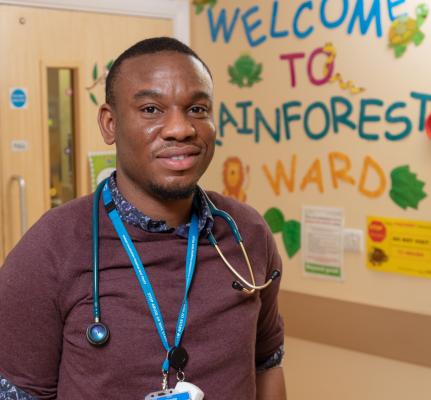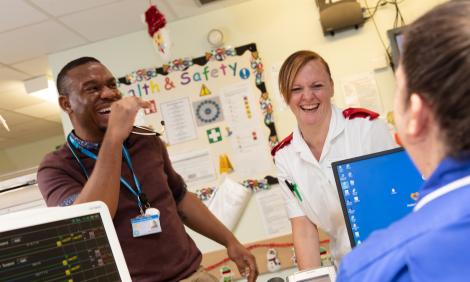Paediatrician
Paediatricians manage medical conditions affecting infants, children and young people.
You’ll see a wide range of patients, from babies through to teenagers.
Life as a paediatrician
Your day-to-day responsibilities could include caring for acute cases on wards and in A&E, as well as outpatient consultations and managing long-term conditions. You’ll liaise closely with your patients’ families and carers, managing sensitive and sometimes emotional discussions about treatment.
You’ll work with a range of healthcare professionals and provide clinical advice to social services, education and other agencies. You’ll have opportunities to develop close links with other areas of medicine such as primary care, child and adolescent psychiatry and public health.
You can choose to specialise within paediatrics and develop skills in a variety of medical fields, including community paediatrics, child mental health, neonatal intensive care, paediatric emergency medicine, oncology and palliative medicine.
You’ll find the work stimulating and challenging. Your work could include anything from high-tech care for new born babies in a hospital through to managing care for children with disabilities in the community.
Dr Kene Maduemem
Paediatric registrar
Read Kene's storyPaediatrics is not a speciality to delve into just because you love children. It entails dealing with the children, family, school and the community at large.

How much can I earn?
You’ll first earn a salary when you start your foundation training after medical school. Find out details of current salary ranges for foundation and specialty training, SAS doctors and consultants on the 'Pay for doctors' page.
How about the benefits?
- make a difference
- flexible and part-time working
- high income early in your career
- work anywhere in the world
- excellent pension scheme
- good holiday entitlement
- NHS discounts in shops and restaurants
Must-have skills
- excellent communication skills to manage a wide range of relationships with colleagues, and patients and their families
- emotional resilience, a calm temperament and the ability to work well under pressure
- teamwork and the capacity to lead multidisciplinary teams
- problem-solving and diagnostic skills
- outstanding organisational ability and effective decision-making skills
- first-class time and resource management for the benefit of patients
Entry requirements
Your first step is medical school. Typically, you’ll need excellent GCSEs and three A or A* passes at A level including chemistry for a five-year undergraduate degree in medicine. Many medical schools also ask for biology and others may require maths or physics.
If you already have a degree, you could study for a four-year postgraduate degree in medicine.
You’ll need to pass an interview and admissions test. You’ll be asked to show how you demonstrate the NHS values such as compassion and respect.
Some medical schools look to recruit a mix of students from different backgrounds and geographical areas, so your educational and economic background and family circumstances could be considered as part of your application.
What are my chances of starting a career in paediatrics?
In 2020 there were 712 applications for 461 specialty training places.
How to become a paediatrician
After medical school, you’ll join the paid two-year foundation programme where you’ll work in six placements in different settings.
After your foundation programme, you can apply for paid specialty training to become a paediatrician, which will take a minimum of eight years.
You may be able to train part time, for example for health reasons or if you have family or caring responsibilities.
Where a career in paediatrics can take you
You could:
- specialise or conduct research in areas such as diabetes, neurodisability, nutrition, gastroenterology or public health
- teach medical students or postgraduate students in training
- get involved in research at universities, the NHS or private sector
Sorry, we don’t currently have any vacancies in your area.
You can try expanding your search area or search a different postcode.
-
The Royal College of Paediatrics and Child Health has further information about being a paediatric doctor, particularly as your career progresses. Take a look.





